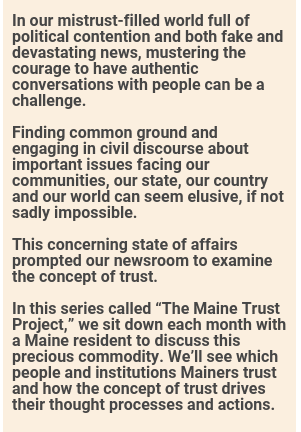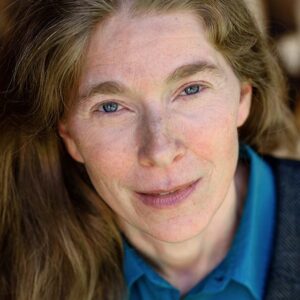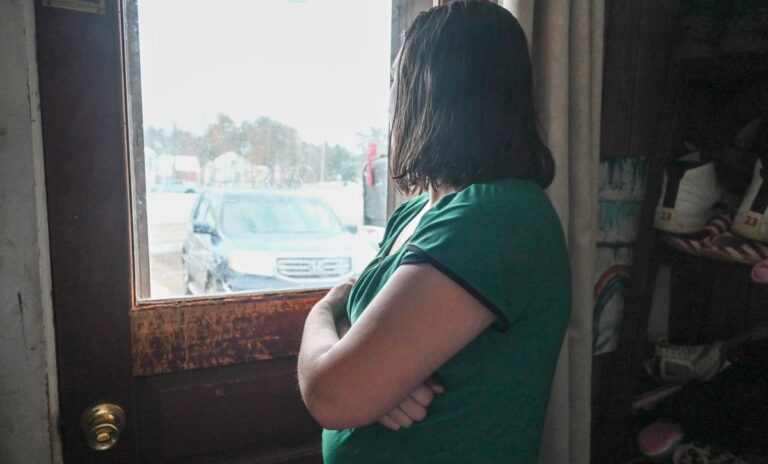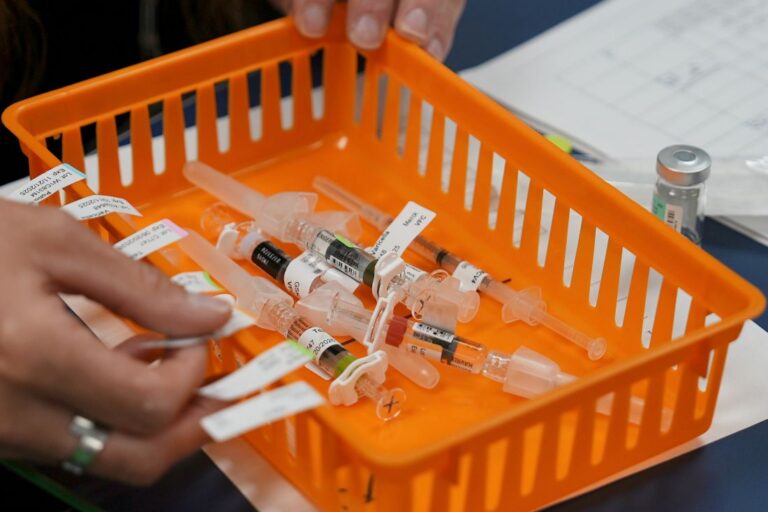When Anna — who goes by Anne — Roosevelt retired from her job as vice president of global corporate citizenship for the aerospace behemoth Boeing, she looked forward to leaving the corporate world behind and being a grandmother.
To that end she needed to move near one of her two daughters. One lived in the Midwest, and the other had married a Mainer and settled in central Maine. “How can you choose between two beloved daughters?” she said. “You can’t do that so I had to rely on the landscape.”
 Anne, who spent many years living in the Midwest, loved the plains, but the plains, she noted, are flat. So she chose to move to Maine to live between the mountains and the ocean.
Anne, who spent many years living in the Midwest, loved the plains, but the plains, she noted, are flat. So she chose to move to Maine to live between the mountains and the ocean.
The granddaughter of Franklin D. and Eleanor Roosevelt, Anne’s family has a long, multigenerational relationship with Maine, but she herself hadn’t spent any time here. The daughter of Franklin and Eleanor’s oldest son, James, Anne was born and raised in California, and spent all of her life in and around cities.
“To be this surrounded by natural beauty without a built environment dominating is a new thing for me,” she said. “It has been surprisingly moving to wake up every morning and see a different scene, even though it’s the same lake, it’s the same mountainside. The atmosphere, the air is different. The vegetation is a little bit different. It’s fascinating to me. I’ve always been a city person so this is really like starting a whole new life.”
As part of her new life, Anne postponed retirement to serve as CEO and president of Goodwill Industries of New England from 2011-18. Now “officially” retired, she puts her energies into various volunteer roles, including serving on the board of the Maine Community Foundation, which provides grant support to the Maine Center for Public Interest Reporting, and the Roosevelt Institute, a think tank and nonprofit partner to the Franklin D. Roosevelt Presidential Library and Museum in New York.
But a big part of her daily life at her central Maine home is her involvement in Skowhegan-based Maine Grains, a traditional gristmill that grinds local grains and distributes them to an international market.
She’s made a monetary investment to help support the venture, but also has invested herself. When not in lockdown, she can be found helping out in the mill shop. “I have enjoyed immensely going in to actually be a part of the workforce,” she said. “It has really given me such a picture of the community and the possibilities of living in a small town, and what rural communities are all about, what they can do that is impossible if you live in a dense urban setting.
“I’m still learning,” she adds. “I’m so devoted to learning more about the value of the rural experience. It’s not just all about recreation. It is a different pattern of living. It’s at the roots of our country, but it is a much rarer thing these days.”
Q&A
Because your family is so well known, has that made trust more challenging?
Anne: I think it has been. I can’t speak for everyone in my family, but for me, perhaps, it figured into my slower maturity. When there’s some force in your life that really isn’t essentially you, and at the same time it is and you can’t escape it — people can make it difficult to figure out how to reconcile those tensions in your life. If you’re looking for someone to be trustworthy and then you find that they’re really just interested in a celebrity that you don’t even feel belongs to you, that’s not encouraging. So yes, it can be difficult.
Who meets your definition of trust?
Anne: My daughters are people I trust, and both my brothers, but my oldest brother, Jim, in particular, is someone I have trusted implicitly all my life. He doesn’t feel he needs to protect himself and is able to totally focus on the other person’s good, and is consistent. I think he’s just an amazing person.
If I see somebody who doesn’t feel the need to protect themselves by telling a lie, I feel more able to trust them. People who are truthful and say “I’m sorry” and say “man, that was not a good decision and I have a different opinion now.”
One of the things I so admired about my grandmother was how public she was about her mistakes and her changes of mind. I think as a public we have a tendency to always stand for one thing. We don’t allow them to be human beings. She was such a good example of how you can be the person you are and have one idea at one point in your life, and then you learn other things and you go through other experiences so you have different opinions and that’s OK. That’s a good thing. It’s not being wishy-washy and it’s not being somehow insincere. It’s maturing. So again, that’s an attribute of a person who I would find trustworthy.
When you start to think about who you trust, I think we very easily have partial trust in a lot of people. I think we have to have that attitude of starting out with trust but then modifying it with “well, I trust him in this way or to do these things.” I certainly feel that way about political candidates. I am going to pick the person who I trust to be closest to my set of right and wrong, but they’re not always going to make the same decisions I might make in how to exercise that right and wrong.
Who doesn’t meet your definition of trust?
Anne: Our days are so full of our political situation that I cannot answer that question without naming our current president. It is so utterly appalling to me that a person so untrustworthy, so unable to tell the truth, so unable to think of the public good, so unable to lead in a fashion that actually builds our country rather than destroying democratic institutions is the ultimate leader of our precious democracy. It is a terrifying place that we are in now.
What breaks trust for you?
Anne: The most serious is malicious lying. You can be a little disappointed in somebody and that will break your trust a little bit, make you a little more wary, but those things can be recovered. But when somebody is cruel and lies to protect themselves or to make themselves feel good or to think they’re making others feel good about them, I don’t know how you repair that.
So can broken trust be healed and if so, what has to happen for healing to take place?
Anne: The only way to repair broken trust is a long history of humility and humble demonstration of reparations, of making amends for the damage you’ve done, and not seeing there’s an end to that. Not thinking that you’ve done enough, but feeling the seriousness of that kind of behavior.
Has your definition of trust changed over the years?
Anne: No, I don’t think so, but I would say that as I’ve struggled with maturity myself over 70 years, it has developed in my thinking. It has become more and more a focus for me as I live my life. I ask myself more often, am I telling the truth to myself? Am I telling the truth to my grandchildren? Am I telling the truth to my kids? Am I telling the truth to my friends? Or am I thinking that I’m being polite, and how can I reconcile both my wish that they not have an unpleasant experience and the need to say something that’s truthful.’
Do you think the cultural definition of trust has changed over the years?
Anne: I thought about this a lot. The fact that slightly less than 50 percent of this country felt they could trust this person to be the President of the United States is a mystery to me. So I really don’t know.
What I do know is that looking through history through the window of literature, trust, the fundamental definition of trust, is really at the root of every story. From ancient literature through contemporary — “Julius Caesar” to popular murder mysteries to a book I just finished reading, “Hullabaloo in the Guava Orchard,” — what we’re really talking about is who can we trust and what difference does that make in our lives, either individually or as a community, or as a nation or even globally.
That is, I think, the fundamental question. People’s lives can be made so lonely when there’s nobody they can trust. I worry a lot that in our geopolitical situation, this notion of trust is being abused, and that more and more people will fall into a space where they don’t know how to trust, and people will mistake error and frailty as being catastrophic, and we’ll never be able to come together again.
What worries you?
Anne: What worries me the most is I see an unwillingness to work together, to think outside of ourselves, to think in the framework of the common good. Perhaps because I was raised with a concept of freedom that extended to everyone and wasn’t focused on myself but rather on my ability to enable others to be free, I grieve and I worry over the misuse of freedom.
What inspires you?
Anne: People who step forward in trust, especially people who have been betrayed. These repeated horrible instances that happen with people whose lives are taken by law enforcement – those people step forward in trust and give their lives for it. That inspires me not to be negative about law enforcement but to demand that law enforcement be what it’s supposed to be. To not just say “law enforcement is terrible” but to say “what do you need to be better? What can I do as a taxpayer to enable you to be better?”
Whenever I see someone who steps out of their comfort zone in trust because they want to do something good, they want to be part of a community, a part of a society, a part of a nation, I’m inspired by them. The Roosevelt Institute gives awards called the Four Freedoms awards. Those awardees are inspiring. They have the characteristic of stepping forward in trust. They say “there’s a good out there, and I need to step up and make it available to more people.”
What issues do you think are important today?
Anne: I think the status of democracy is at risk globally, even, unfortunately, here in this country. By at risk, I mean that democracy takes work. We look to our Constitution, to our Declaration of Independence, to our foundational documents to remember what it is that we’re doing here, and what we’re doing here is shaping structures that enable the most people to live lives of dignity and fulfillment. Nations around the world have looked to our model to emulate as they’ve put together their own foundation documents that give rise then to the structures that enable government. But I see those foundations being manipulated. I see a lot of lies. I see a lot of people being sacrificed for the good of the few — not just in other countries but in our own, which is such a terrible betrayal after having the honor of being the nation that would prepare the model.
Please share a memorable trust moment from your life.
Anne: When my oldest granddaughter was in nursery school, they had a little exercise about stranger danger. One of their classroom tasks was to draw a picture of their trusted adult and she drew a picture of me. It still chokes me up. It’s a big responsibility and very inspiring to me.
Get to know Anne Roosevelt
Age: 72
Hometown: Embden
Religious affiliation: I’m a faithful person but not a religious person.
Political affiliation: Democrat
How she describes herself: A person who wants to be trusted and who has worked at that for my whole life. I want to be honest and considerate. I’m better at it now than I have been in previous decades.
How she defines trust: I think it’s very valuable to think about words like this because we take them for granted and then we forget, maybe, what their importance is and perhaps misuse them.
When I use the word trust, I mean there is an element of reliability and confidence and a sort of otherness — thinking outside of yourself. So someone I trust is a person who I think is also thinking about me or about other people; someone who is not totally self-absorbed.
I think it is also the means to forge close bonds that are important in the development of family and society, and community at every level. But the most important element of trust, I think for me anyway, is truth. I think truth is terribly difficult. Lying is a protection mechanism. I think that learning how not to lie and learning how not to feel that you need to protect yourself is a maturation. I think that many, many, many people don’t really understand truth in their whole lives. It takes some of us even well into adulthood.
I can also say that I can trust a person to be snarky or something. So we use it in this way to indicate reliability, but to me the much more important use of it is about this being relied upon to not lie. You can be considerate, you can be polite and should be, but when it comes right down to it, if I trust you, I want you to be able to say something that is difficult in a selfless way.







